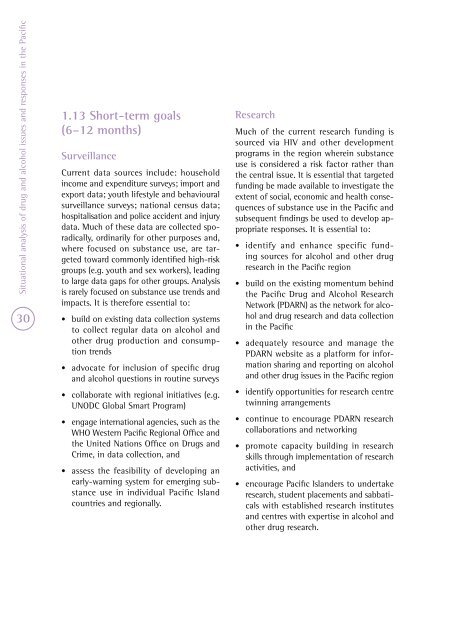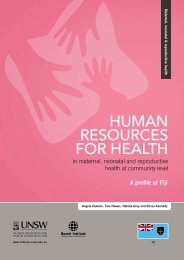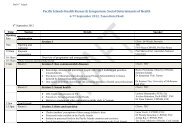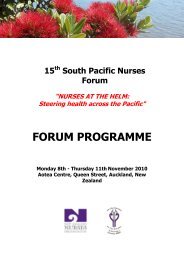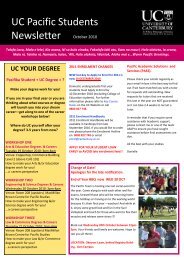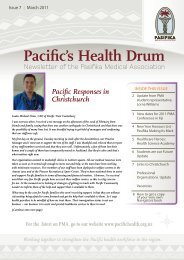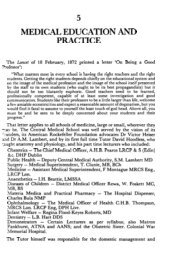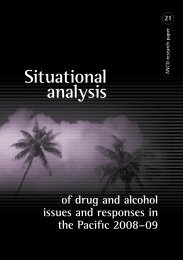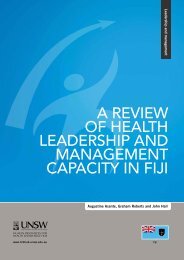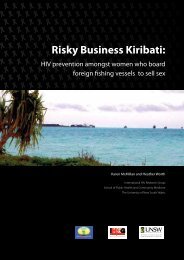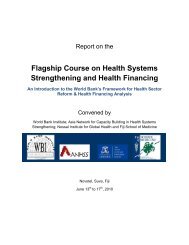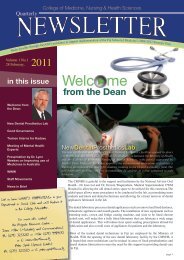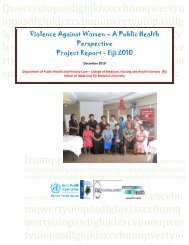rp21 situational analysis - Pacific Health Voices
rp21 situational analysis - Pacific Health Voices
rp21 situational analysis - Pacific Health Voices
You also want an ePaper? Increase the reach of your titles
YUMPU automatically turns print PDFs into web optimized ePapers that Google loves.
Situational <strong>analysis</strong> of drug and alcohol issues and responses in the <strong>Pacific</strong><br />
30<br />
1.13 Short-term goals<br />
(6–12 months)<br />
Surveillance<br />
Current data sources include: household<br />
income and expenditure surveys; import and<br />
export data; youth lifestyle and behavioural<br />
surveillance surveys; national census data;<br />
hospitalisation and police accident and injury<br />
data. Much of these data are collected sporadically,<br />
ordinarily for other purposes and,<br />
where focused on substance use, are targeted<br />
toward commonly identified high-risk<br />
groups (e.g. youth and sex workers), leading<br />
to large data gaps for other groups. Analysis<br />
is rarely focused on substance use trends and<br />
impacts. It is therefore essential to:<br />
• build on existing data collection systems<br />
to collect regular data on alcohol and<br />
other drug production and consumption<br />
trends<br />
• advocate for inclusion of specific drug<br />
and alcohol questions in routine surveys<br />
• collaborate with regional initiatives (e.g.<br />
UNODC Global Smart Program)<br />
• engage international agencies, such as the<br />
WHO Western <strong>Pacific</strong> Regional Office and<br />
the United Nations Office on Drugs and<br />
Crime, in data collection, and<br />
• assess the feasibility of developing an<br />
early-warning system for emerging substance<br />
use in individual <strong>Pacific</strong> Island<br />
countries and regionally.<br />
Research<br />
Much of the current research funding is<br />
sourced via HIV and other development<br />
programs in the region wherein substance<br />
use is considered a risk factor rather than<br />
the central issue. It is essential that targeted<br />
funding be made available to investigate the<br />
extent of social, economic and health consequences<br />
of substance use in the <strong>Pacific</strong> and<br />
subsequent findings be used to develop appropriate<br />
responses. It is essential to:<br />
• identify and enhance specific funding<br />
sources for alcohol and other drug<br />
research in the <strong>Pacific</strong> region<br />
• build on the existing momentum behind<br />
the <strong>Pacific</strong> Drug and Alcohol Research<br />
Network (PDARN) as the network for alcohol<br />
and drug research and data collection<br />
in the <strong>Pacific</strong><br />
• adequately resource and manage the<br />
PDARN website as a platform for information<br />
sharing and reporting on alcohol<br />
and other drug issues in the <strong>Pacific</strong> region<br />
• identify opportunities for research centre<br />
twinning arrangements<br />
• continue to encourage PDARN research<br />
collaborations and networking<br />
• promote capacity building in research<br />
skills through implementation of research<br />
activities, and<br />
• encourage <strong>Pacific</strong> Islanders to undertake<br />
research, student placements and sabbaticals<br />
with established research institutes<br />
and centres with expertise in alcohol and<br />
other drug research.


